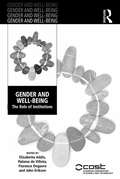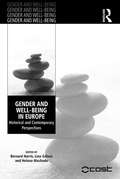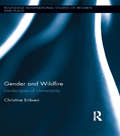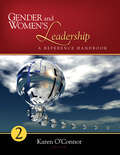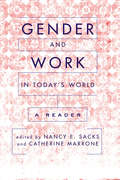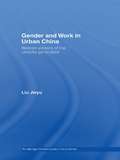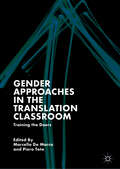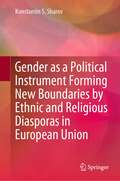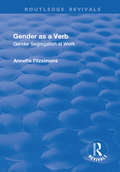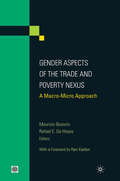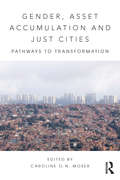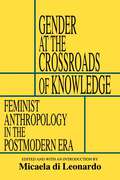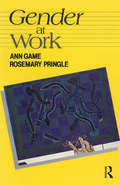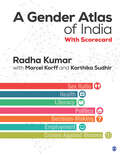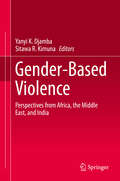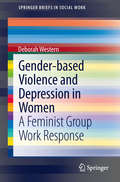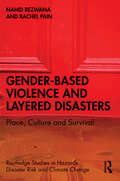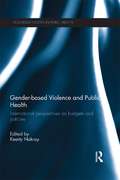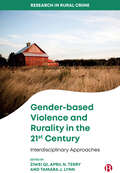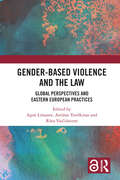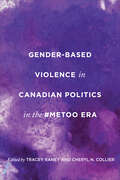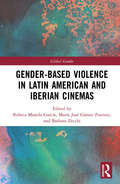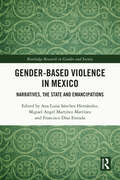- Table View
- List View
Gender and Well-Being: The Role of Institutions (Gender and Well-Being)
by Paloma de Villota John EriksenProvisioning for basic human needs is done in three main kind of institutions: the familial household; the commercial enterprise selling goods and services; the institutions of the Welfare State that provide education, medical care and other goods and personal services to all or to some specific groups of citizens in need. The purpose of this book is to study the interplay of these institutions and their impact on well-being, and to analyze key policies and measures that have been implemented in European countries. Institutions determine labour demand (men and women are hired by the institutions of the Welfare State or by market providers of care), the possibilities of consumption (wages earned can be used to buy goods and services only if such goods and services are provided by the market) and allocate people's time, in particular women's time, between paid work and unpaid domestic production and provision of care, shaping both the gender relations and time use of people of both sexes. The proper balance of these institutions is a prerequisite of well-being both of the care givers and of the care receivers, and also for satisfactory gender relations. The chapters in this book focus on the following sub-topics: gender and welfare regimes; gender, well-being and the provision of care in the family and the household; and gender and well-being in the labour market. They emphasise the interdependence of social and labour market policies in the context of fundamental changes in both working patterns (the increase in female labour-force participation rates) and social needs (including population ageing) and demonstrate that we need a more integrated approach to welfare policy which takes account not only of basic welfare entitlements, but also the need for supportive forms of service provision and employment regulation.
Gender and Well-Being in Europe: Historical and Contemporary Perspectives (Gender and Well-Being)
by Lina GálvezThis book is the first of four books based on a series of symposia funded by COST, which is an intergovernmental framework for the promotion of European Cooperation in the field of Scientific and Technical Research. It draws on both historical and contemporary European case-studies to offer a sophisticated account of the relationship between gender and well-being. The authors focus on key discussions of the changing conceptions of well-being from early twentieth century calculations of the relationship between income and the cost-of-living, to more recent critiques from feminist writers. Their fascinating answers allow them to significantly challenge the issue with the idea that well-being is not only associated with income or opulence but also relates to more abstract concepts including capabilities, freedom, and agency of different women and men and will be of considerable interest to economic and social historians, sociologists of health, gender, sexuality and economists.
Gender and Wildfire: Landscapes of Uncertainty (Routledge International Studies of Women and Place #13)
by Christine EriksenIn pursuit of lifestyle change, affordable property, and proximity to nature, people from all walks of life are moving to the wildland-urban interface. Tragic wildfires and a predicted increase in high fire danger weather with climate change have triggered concern for the safety of such amenity-led migrants in wildfire-prone landscapes. This book examines wildfire awareness and preparedness amongst women, men, households, communities and agencies at the interface between city and beyond. It does so through an examination of two regions where wildfires are common and disastrous, and where how to deal with them is a major political issue: southeast Australia and the west coast United States. It follows women’s and men’s stories of surviving, fighting, evacuating, living and working with wildfire to reveal the intimate inner workings of wildfire response – and especially the culturally and historically distinct gender relations that underpin wildfire resilience. Wildfire is revealed as much more than a "natural" hazard – it is far from gender-neutral. Rather, wildfire is an important means through which traditional gender roles and power relations are maintained despite changing social circumstances. Women’s and men’s subjectivities are shaped by varying senses of inclusion, exclusion, engagement and disengagement with wildfire management. This leads to the reproduction of gender identities with clear ramifications for if, how and to what extent women and men prepare for wildfire.
Gender and Women's Leadership: A Reference Handbook
by Dr Karen P. O'ConnorThis work within The SAGE Reference Series on Leadership provides undergraduate students with an authoritative reference resource on leadership issues specific to women and gender. Although covering historical and contemporary barriers to women's leadership and issues of gender bias and discrimination, this two-volume set focuses as well on positive aspects and opportunities for leadership in various domains and is centered on the 101 most important topics, issues, questions, and debates specific to women and gender. Entries provide students with more detailed information and depth of discussion than typically found in an encyclopedia entry, but lack the jargon, detail, and density of a journal article.Key FeaturesIncludes contributions from a variety of renowned expertsFocuses on women and public leadership in the American context, women's global leadership, women as leaders in the business sector, the nonprofit and social service sector, religion, academia, public policy advocacy, the media, sports, and the artsAddresses both the history of leadership within the realm of women and gender, with examples from the lives of pivotal figures, and the institutional settings and processes that lead to both opportunities and constraints unique to that realmOffers an approachable, clear writing style directed at student researchersFeatures more depth than encyclopedia entries, with most chapters ranging between 6,000 and 8,000 words, while avoiding the jargon and density often found in journal articles or research handbooks Provides a list of further readings and references after each entry, as well as a detailed index and an online version of the work to maximize accessibility for today's student audience
Gender And Work In Today's World: A Reader
by Nancy SacksPromoting gender equality through balanced analysis of both sexes, Gender and work in Today's World: A Reader explores the experiences of both men and women in the work force, focussing especially on gender-non-traditional jobs (i.e. men as nursed and women in the police force) and non-traditional work structures (i.e. Part-time,temporary, and odd-hour work), work over the life course, and sexual harassment.
Gender and Work in Urban China: Women Workers of the Unlucky Generation (Routledge Contemporary China Series)
by Jieyu LiuAlthough it is generally believed in China that socialism raised women’s status and paid work liberated them from the shackles of patriarchy, the economic reforms of the last two decades of the twentieth century meant women workers were more vulnerable to losing their jobs than men. Unlike previous studies, which have focused on the macro-structural features of this process, this book makes the voices of ordinary women workers heard and applies feminist perspectives on women and work to the Chinese situation. Drawing upon extensive life history interviews, this book contests the view that mobilizing women into the workplace brought about their liberation. Instead, the gendered redundancy they experienced was the culmination of a lifetime’s experiences of gender inequalities. Setting their life stories against a backdrop of great social-political upheaval in China, the book suggests that the women of this ‘unlucky generation’ have borne the brunt of sufferings caused by sacrifices they made for the development of socialist China.
Gender Approaches in the Translation Classroom: Training the Doers
by Marcella De Marco Piero TotoThis volume examines strategies for embedding gender awareness within translation studies and translator training programmes. Drawing on a rich collection of theoretically-informed case studies, its authors provide practical advice and examples on implementing gender-inclusive approaches and language strategies in the classroom. It focuses on topics including, how to develop gender-inclusive practices to challenge students’ attitudes and behaviours; whether there are institutional constraints that prevent trainers from implementing non-heteronormative practices in their teaching; and how gender awareness can become an everyday mode of expression. Positioned at the lively interface of gender and translation studies, this work will be of interest to practitioners and scholars from across the fields of linguistics, education, sociology and cultural studies.
Gender as a Political Instrument Forming New Boundaries by Ethnic and Religious Diasporas in European Union
by Konstantin S. SharovThis book considers gender as a convenient tool for making new boundaries within the European Union. It offers a political analysis based on sociological surveys conveyed by the author in 2008–2021. It emphasises the utmost necessity of a proper understanding of specific gender political technologies applied in ethnic and religious diasporas within the EU borders, by EU ruling elites, to avoid ideological collapse in relations with diaspora political groups and general members. The book demonstrates that uncritical application of EU gender equality programs within diasporas may transform gender to a dangerous political force destabilising the European Union. The monograph will be of interest for political science researchers, legislators, and administrators that work with political dimension of gender.
Gender as a Verb: Gender Segregation at Work (Routledge Revivals)
by Annette FitzsimonsThis title was first published in 2002. Aiming to contribute to feminist theory in the area of paid employment, this volume demonstrates how the meanings attached to gender can form part of the explanation for the persistence of gender segregation at work. The author applies the Foucaultian concept of discourse to occupational segregation to offer a new approach to the study of gender segregation. An analysis is provided of gender in relation to computer programming.
Gender Aspects of the Trade and Poverty Nexus
by Rafael E. De Hoyos Maurizio Bussolo Ravi KanburTrade liberalization can create economic opportunities for poor people. But are these opportunities available to men and women equally? Do the gender disparities in access to education, health, credit, and other resources limit the gains from trade and the potential benefits to poor women? This volume introduces the gender dimension into empirical analyses of the links between trade and poverty, which can improve policy making. The collection of chapters in this book is close to an ideal macro-micro evaluation technique that explicitly assesses the importance of gender in determining the poverty effects of trade shocks. Part I, relying on ex ante simulation approaches, focuses on the macroeconomic links between trade and gender, where labor market structure and its functioning play a key role. Part II concentrates on micro models of households and attempts to identify the ex post effects of trade shocks on household income levels and consumption choices. It also addresses questions about possible changes in inequality within households due to improved economic opportunities for women. 'Gender Aspects of the Trade and Poverty Nexus' will be invaluable to policy makers, development practitioners and researchers, journalists, and students.
Gender, Asset Accumulation and Just Cities: Pathways to transformation
by Caroline O.N. MoserWith more than half the world’s population now living in urban areas, urbanisation is undoubtedly one of the most important phenomena of the 21st century. However, despite increasing recognition of the critical relationship between economic and social development in cities, gender issues are often overlooked in understanding the complexities of current urbanisation processes. This book seeks to rectify this neglect. Gender, Asset Accumulation and Just Cities explores the contribution that a focus on the gendered nature of asset accumulation brings to the goal of achieving just, more equitable cities. To date neither the academic debates nor the formulated policy and practice on just cities has included a focus on gender-based inequalities, discriminations, or opportunities. From a gender perspective, a separate discourse exists, closely associated with gender justice, particularly in relation to urban rights and democracy. Neither, however, has addressed the implications for women’s accumulation of assets and associated empowerment for transformational pathways to just cities. In this book, contributors specifically focus on gender and just cities from a wide range of gendered perspectives that include households, housing, land, gender-based violence, transport, climate, and disasters.
Gender at the Crossroads of Knowledge: Feminist Anthropology in the Postmodern Era
by Micaela Di LeonardoGender at the Crossroads of Knowledge brings feminist anthropology up to date, highlighting the theoretical sophistication that characterizes recent research. Twelve essays by outstanding scholars, written with the volume's concerns specifically in mind, range across the broadest anthropological terrain, assessing and contributing to feminist work on biological anthropology, primate studies, global economy, new reproductive technologies, ethno-linguistics, race and gender, and more. The editor's introduction not only sets two decades of feminist anthropological work in the multiple contexts of changes in anthropological theory and practice, political and economic developments, and larger intellectual shifts, but also lays out the central insights feminist anthropology has to offer us in the postmodern era. The profound issues raised by the authors resonate with the basic interests of any discipline concerned with gender, that is, all of the social sciences and humanities.
Gender at Work
by Rosemary Pringle Ann GameThree themes are drawn together in this book: gender and sexuality, the organisation of work, and the impact of technological change. Their inter-relationship is explored in six area studies: manufacturing, banking, retailing, computing, nursing and housework.Gender at Work presents an account of how each area has changed since the Second World War; sets out ways in which the notion of what constitutes 'proper' work for men and women changes with new work processes; and analyses the prospects for, and limits of, sexual 'equality' in the workplace.Based on the first-hand observations of workers, reflecting on their work experience, this book allows workers to speak for themselves: they reveal the centrality of gender to the way capitalism is organised.'A notable contribution, both to feminist and labour studies in Australia and further afield. Every woman, whether at home or in the paid workforce, should read this book. It will help her assess exactly what she is - and should be - worth to the community, and how she can help to ensure her true evaluation.' - Newcastle Herald'A very readable book which makes a major theoretical and descriptive contribution to the analysis of gender in Australian Society.' - Journal of Industrial Relations'A convincing demonstration of the central place of gender in the work relationships between men and women. The insights it provides, into the underlying causes of the sex division of tasks and the way in which new jobs in any individual setting quickly become sex-typed, are important for any manager of a mixed workplace.' - Practising Manager
A Gender Atlas of India: With Scorecard
by Radha Kumar Marcel Korff Karthika SudhirA Gender Atlas of India is a seminal body of work which comprehensively maps and grades India’s performance from 2001 to 2016 on issues of concern for women. Taking into account 8 overall indicators and 28 sub-indicators, it looks at how India is performing on various aspects, including sex ratio, women’s education, employment, health, political participation and representation; and prevention of crimes against women. Unlike previous attempts, this book examines the change in India’s performance over a 15-year period, compares the situation of women in India to that in its neighborhood and internationally, and rates each Indian state and union territory individually. The findings in this book are both provocative and incentivizing for policymakers—they show that where the central and state governments share concerns India’s performance on gender has improved, but where they diverge women’s condition has deteriorated even further. With data from a range of government and independent institutions, the Census of India, Family Health Surveys, UN Statistics, World Bank data, and NGO and industry surveys, this book is an essential reference for policymakers, government departments, libraries, and individuals.
Gender-Based Violence
by Yanyi K. Djamba Sitawa R. KimunaThis book offers new perspectives on gender-based violence in three regions where the subject has been taboo in everyday discourse often due to patriarchal cultural norms that limit women's autonomy. The contributions to this book provide rare insight into not only the levels and the socio-demographic determinants of domestic violence, but topics ranging from men's attitudes toward wife beating; domestic violence-related adolescent deaths, and women's health problems due to sexual and physical abuse. With a comprehensive introduction that provides a comparative international research framework for discussing gender-based violence in these three unique regions, this volume provides a key basis for understanding gender-based violence on a more global level. Part I, on Africa, covers men's attitudes towards domestic violence, the impact of poverty and fertility, the association between adolescent deaths and domestic violence, and the link between domestic abuse and HIV. Part II, on the Middle East, covers the importance of consanguinity on domestic violence in Egypt and Jordan, the effects of physical abuse on reproductive health, and the link between political unrests and women's experience and attitudes towards domestic violence. Part III, on India, shows how sexual abuse puts women at risk of reproductive tract infections and sexually transmitted infections, as well as the role of gender norms in wife abuse and the role of youth aggressive behavior in nonconsensual sex. With such a deep and broad coverage of factors of intimate partner abuse, this book serves as a reference document for researchers, decision-makers, and organizations that are searching for ways to reduce gender-based domestic violence. This book is of interest for researchers in Criminology and Criminal Justice, as well as Sociology, Social Work, Public Health and Human Rights.
Gender-based Violence and Depression in Women
by Deborah WesternSocial workers, in whatever capacity they work, can expect to come into contact with women who have experienced/are experiencing violence and with women who are experiencing depression. Therefore, a range of social work supports and interventions are required in order to meet the needs of diverse women and assist them in their recovery. One of these methods is group work where women can share their experiences, learn from each other, reflect on their learnings and identify and achieve changes in their circumstances. This book is based on original research by the author that sought to understand depression in women from a feminist and gender-informed perspective, develop a feminist-based group work response, and highlight the activities of consciousness-raising and resistance as methods for women to achieve change in their lives and in their selves. An innovative and creative group work program, the Women's Journaling Group Program, was developed from this research and provides a new method of working with women who have experienced/are experiencing violence and mild-moderate depression. The Women's Journaling Group Program is research-informed, theoretically-grounded, practice-based and feminist and gender-focused. This book, and the program model within it, is an important contribution to the field of critical feminist social work practice.
Gender-Based Violence and Layered Disasters: Place, Culture and Survival (Routledge Studies in Hazards, Disaster Risk and Climate Change)
by Nahid Rezwana Rachel PainThis book investigates the widespread and persistent relationship between disasters and gender-based violence, drawing on new research with victim-survivors to show how the two forms of harm constitute ‘layered disasters’ in particular places, intensifying and reproducing one another. The evidence is now overwhelming that disasters and gender-based violence are closely connected, not just in moments of crisis but in the years that follow as the social, economic and environmental impacts of disasters play out. This book addresses two key gaps in research. First, it examines what causes the relationship between disasters and gender-based violence to be so widespread and so enduring. Second, it highlights victim-survivors’ own accounts of gender-based violence and disasters. It does so by presenting findings from original research on cyclones and flooding in Bangladesh and the UK and a review of global evidence on the Covid-19 pandemic. Drawing on feminist theories, it conceptualises the coincidence of gender-based violence, disasters and other aggravating factors in particular places as ‘layered disasters.’ Taking an intersectional approach that emphasises the connections between culture, place, patriarchy, racism, poverty, settler-colonialism, environmental degradation and climate change, the authors show the significance of gender-based violence in creating vulnerability to future disasters. Forefronting victim-survivors’ experiences and understandings, the book explores the important role of trauma, and how those affected go about the process of survival and recovery. Understanding disasters as layered casts light on why tackling gender-based violence must be a key priority in disaster planning, management and recovery. The book concludes by exploring critiques of existing formal responses, which often ignore or underplay gender-based violence. The book will be of interest to all those interested in understanding the causes and impacts of disasters, as well as scholars and researchers of gender and gender-based violence.
Gender-based Violence and Public Health: International perspectives on budgets and policies
by Keerty NakrayGender-based violence is a multi-faceted public health problem with numerous consequences for an individual’s physical and mental health and wellbeing. This collection develops a comprehensive public health approach for working with gender-based violence, paying specific attention to international budgets, policies and practice and drawing on a wide selection of empirical studies. Divided into two parts, the text looks at how public health budgets and policies can be used to influence a range of risk factors and outcomes, and then outlines a theoretical and conceptual framework. The second section draws on empirical studies to illustrate ways of managing the risks and impacts of, and responses to, the problem. It concludes by summarising those risk factors that can be effectively addressed through appropriately budgeted public health programmes globally. Highlighting ways of bolstering protective and resilience factors and identifying early interventions, it demonstrates the importance of inter-agency interventions through coordinated effort from a wide range of sectors including social services, education, religious organisations, judiciary, police, media and business. This inter-disciplinary volume will interest students and researchers working on gender-based violence, gender budgeting and public health policy from a range of backgrounds, including public health, sociology, social work, public policy, gender studies, development studies and economics.
Gender-based Violence and Rurality in the 21st Century: Interdisciplinary Approaches
by Ziwei Qi, April N. Terry, Tamara J. Lynn and Walter S. DeKeseredyGender-based violence (GBV) can take many forms and have detrimental effects across generations and cultures. The triangulation of GBV, rurality and rural culture is a challenging and essential topic and this edited collection provides an innovative analysis of GBV in rural communities. Focusing on under-studied and/or oppressed groups such as immigrants and LGBTQIA+ people, the book explores new theories on patterns of violence. Giving insights into GBV education and prevention, the text introduces community justice and victim advocacy approaches to tackling issues of GBV in rural areas. From policy review into actionable change, the editors examine best practices to positively affect the lives of survivors.
Gender-Based Violence and the Law: Global Perspectives and Eastern European Practices
by Agnė Limantė Artūras Tereškinas Rūta VaičiūnienėThis book presents a novel and insightful examination of gender-based violence, inviting readers to consider this topic from various perspectives. It encompasses various conceptual discussions and international regulations and trends, while concurrently emphasising the legal regulations and practices of select Central and Eastern European countries. Significantly underrepresented in legal scholarship, this region has been overlooked and subject to limited comprehensive analyses. The authors address different aspects of gender-based violence, also covering some areas that have received little attention in academic literature, such as gender-based violence in academia and cyberstalking. Furthermore, the book incorporates recent empirical studies, thereby endowing readers with valuable insights into the specific challenges encountered in the region. By contributing to current research on gender-based violence in Europe, this publication is an invaluable resource for researchers, students, policymakers, and general readers interested in gender-based violence and the fight against it in the Central and Eastern European region.
Gender-Based Violence and the Law: Global Perspectives and Eastern European Practices
by Agnė Limantė Artūras Tereškinas Rūta VaičiūnienėThis book presents a novel and insightful examination of gender-based violence, inviting readers to consider this topic from various perspectives. It encompasses various conceptual discussions and international regulations and trends, while concurrently emphasising the legal regulations and practices of select Central and Eastern European countries. Significantly underrepresented in legal scholarship, this region has been overlooked and subject to limited comprehensive analyses. The authors address different aspects of gender-based violence, also covering some areas that have received little attention in academic literature, such as gender-based violence in academia and cyberstalking. Furthermore, the book incorporates recent empirical studies, thereby endowing readers with valuable insights into the specific challenges encountered in the region. By contributing to current research on gender-based violence in Europe, this publication is an invaluable resource for researchers, students, policymakers, and general readers interested in gender-based violence and the fight against it in the Central and Eastern European region.
Gender-Based Violence: A Comprehensive Guide
by Parveen Ali Michaela M. RogersThis book provides comprehensive information about various types of gender-based violence (GBV) and abuse. GBV is a major public health and social problem that affects people, mostly women and girls, in every community, culture, and country. GBV refers to the violence or a pattern of abusive behaviours including physical aggression, sexual coercion, psychological abuse and controlling behaviours resulting in physical, sexual or psychological harm. It is associated with severe physical and psychological consequences, and can result in death. . GBV can take many forms including female foeticide, infanticide, female genital mutilation, child marriage, grooming, trafficking, forced marriage, dowry- related abuse, honour-based violence, rape, sexual assault, stalking, harassment, street violence, abuse against older people, domestic violence, and intimate partner violence. It can take place in public, private and virtual settings, and within the context of intimate, familial, community and institutional relationships. While all these forms affect girls and women more, boys and men can also be exposed of various forms of violence including child abuse, sexual abuse, wartime violence, corporal punishment to name a few. This book takes a unique approach and presents an overview of gender-based violence and related practices throughout the world. The book is written in a user friendly manner in order to be accessible as an introductory text to a wide range of readers including students, practitioners and researchers. Edited by a public health academic and a social worker, with contributions representing a wide range of disciplines, the book will appeal to many professions including nurses, midwives, social care and social work practitioners, police, teachers, psychologists, and sociologists.
Gender-Based Violence in Canadian Politics in the #MeToo Era
by Tracey Raney Cheryl N. CollierGender-based violence in politics is a significant and growing problem that threatens the democratic process in Canada. Despite its prevalence, little academic research has been conducted on this topic to date. Gender-Based Violence in Canadian Politics in the #MeToo Era raises awareness of and presents new innovative research on this timely and pressing public issue. Here, leading experts from across Canada uncover critical new insights and identify potential solutions that would help address gender-based violence in politics, improve gender equality, and strengthen Canadian democracy. Using an intersectional lens, chapters range in their approaches; offer new concepts and measures of gender-based violence in online political spaces, political media coverage and cartoons, campaigns, municipal politics, and legislatures; and explore Indigenous ways of knowing about gender-based violence in Canadian politics. Additionally, the volume presents recommendations for decision-makers, policymakers, anti-violence advocates, and the academic community on how to best address the problem of gender-based violence in the political sphere.
Gender-Based Violence in Latin American and Iberian Cinemas (Global Gender)
by García Rebeca Maseda / Gámez Fuentes María José Barbara ZecchiGender-Based Violence in Latin American and Iberian Cinemas rethinks the intersection between violence and its gendered representation. This is a groundbreaking contribution to the international debate on the cinematic construction of gender-based violence. With essays from diverse cultural backgrounds and institutions, this collection analyzes a wide range of films across Latin America and the Iberian Peninsula. The volume makes use of varied perspectives including feminist, postcolonial, and queer theory to consider such issues as the visual configuration of power and inequality, the objectification and the invisibilization of women’s and LGBTQ subjects’ resistance, the role of female film-makers in transforming hegemonic accounts of violence, and the subversion of common tropes of gendered violence. This will be of significance for students and scholars in Latin American and Iberian studies, as well as in film studies, cultural studies, and gender and queer studies.
Gender-Based Violence in Mexico: Narratives, the State and Emancipations (Routledge Research in Gender and Society)
by Martínez Martínez, Miguel Angel Francisco Díaz EstradaThis book examines the roots of systemic aggression against women in contemporary Mexico, and the connection between social practices and the institutional permissiveness of the Mexican State with regard to gendered violence. Since the democratic transition at the end of the 1990s, Mexico has registered an increase in the intensity and types of violence that have made life in some regions almost unsustainable. The chapters in this volume consider that capitalism, colonialism and patriarchy are interrelated processes that employ the technologies of gender and race as a continuation of the symbolic hegemony that treats feminized and racialized bodies as disposable. Against this background, it becomes necessary to understand from different dimensions the systemic violence against women as well as the processes of articulation between social practices and the permissiveness of the State in the face of aggression. Gender-Based Violence in Mexico mobilizes a dialogue between writings, fields of knowledge, causes and situations as essential tools for the struggle against gender violence. As a situated work that underlines the systematic roots of the violence that keeps women in subaltern positions, the text seeks an insurrection, an uprising of the bodies that invite naming the abject, peripheral and unseen populations of the project of globalized life, woven by the obsession of success and prestige. It presents a counter-conclusion in the manner of a beginning in the desire to elaborate counter-political and counter-pedagogical strategies of non-coercive experiences, where questions and debates are not a sign of belligerence but of vitality and care for the body-territories. Gender-Based Violence in Mexico will appeal to scholars of sociology, criminology, gender and Latin American studies with interests in gendered violence and injustice.
